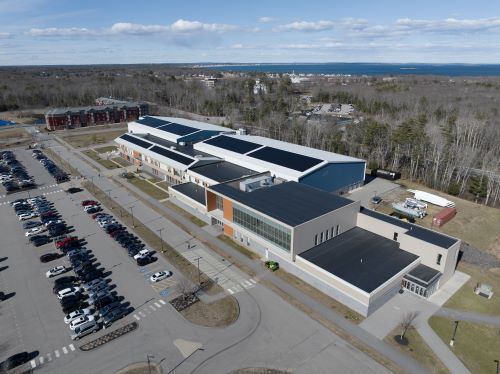University of New England unveils new solar array on Biddeford campus
 |
|
UNE faculty, students and staff gather at the Harold Alfond Forum sports complex on Thursday to celebrate the installation of a new solar array. PHOTO BY LIZ GOTTHELF
|
The University of New England unveiled a new 804-panel solar array at its Biddeford campus on Thursday.
The 321.6-kilowatt solar array sits atop the Harold Alfond Forum sports complex. It’s projected to generate 353,531 kilowatt-hours annually — enough to power 32 area homes, according to UNE officials.
 |
A new solar array sits atop the Harold Alfond Forum sports complex at UNE's Biddeford campus. SUBMITTED PHOTO |
UNE faculty, students and staff gathered on the ground floor of the sports complex on Thursday to celebrate the new solar array and unveil an electronic screen in the building that displays the system’s performance.
“This massive array turns (our renewable energy) vision into reality, and the energy it generates represents a significant stride in our march toward sustainability,” said UNE President James Herbert. “Hopefully, our efforts encourage others to make similar investments in their own lives to minimize their environmental impact.”
Will Kochtitzky, assistant professor of geographic information systems and Co-chair of the Environmental Council, spoke on behalf of the more than 60-member volunteer group, which is composed of faculty, staff and students.
“We aim to make our campus to be more sustainable and resilient,” he said. “Some of our ideas are big, some of them are simple. This solar project was a big idea that took root in the environmental council over seven years ago.”
The new solar array will provide about three percent of the electricity needs on the Biddeford campus, said Kochtitzky.
“We have a long way to go to bring our carbon emissions to zero, but this is a really big step,” he said.
UNE also has three additional photovoltaic arrays at its Maine campuses, – a 12-panel system on Bishop Street on the Portland campus, a 16-panel system atop the Danielle N. Ripich Commons in Biddeford and a 54-panel system at the Arthur P. Girard Marine Science Center in Biddeford.
Hebert praised the efforts of the Environmental Council.
“It’s one thing to sit around and talk about how we would like to reduce our carbon footprint and be more sustainable, it’s a very different thing to think concretely how do we get this done, how do we actually make a difference. That requires more than just the desire, it requires actually digging in and coming up with a plan,” he said.
The Princeton Review named UNE as one of the nation’s most environmentally responsible colleges for seven consecutive years and this year deemed the university one of the country’s top 50 eco-friendly colleges.
Saco Bay News Publisher Liz Gotthelf can be reached at newsdesk@sacobaynews.com.

